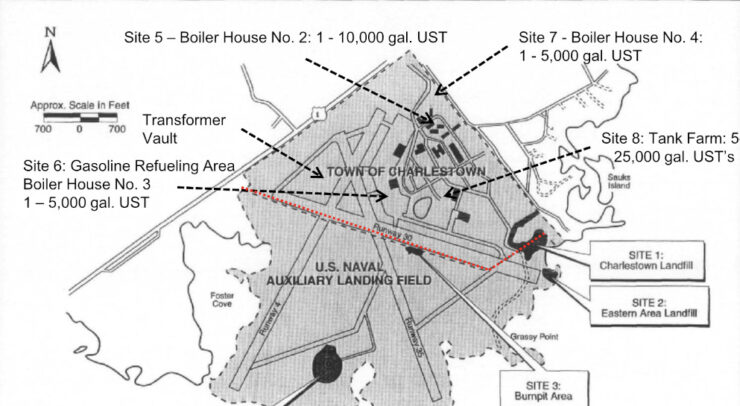Army Corps Presentation On Contamination And Remediation Of Ninigret Park
On February 29, the U.S. Army Corps of Engineers made a presentation in Town Hall on their ongoing work in Ninigret Park. A video of the meeting is below.
Highlights of the Presentation with lots of acronyms:
- Approximately 230 acres of the former Charlestown Naval Auxiliary Landing Field (CNALF) were transferred to the Town of Charlestown in 1979.
- As a Formerly Used Defense Site (FUDS), the Charlestown-owned portion of CNALF has been studied and actions taken under the supervision of various state and federal agencies since the early 1980s.
- Currently, the Army Corps is studying certain areas under the Defense Environmental Restoration Program (DERP). The Army Corps follows the Comprehensive Environmental Response, Compensation, and Liability Act (CERCLA) response process that consists of a Preliminary Assessment, Site Investigation, Remedial Investigation, Feasibility Study, Proposed Plan, Record of Decision, and Remedial Action.
- The Army Corps is performing its current “Remedial Investigation process” in areas of Ninigret Park and the National Wildlife Refuge under CERCLA to understand the nature and extent of chemicals of potential concern (COPCs) and munitions and explosives of concern (MEC) relating to former Department of Defense (DOD) operations at the Charlestown Naval Auxiliary Landing Field.
- The Remedial Investigations consist of the collection, testing, and evaluation of soil and sediment samples as well as groundwater samples collected from more than 100 monitoring wells across Ninigret Park and Ninigret National Wildlife Refuge. The investigations also include sampling wells located on certain properties abutting Ninigret Park.
- Recent environmental data has been collected from 2021 to 2023 with additional sampling planned in 2024 and 2025.
- Based on the results of the above sampling, additional fieldwork beyond 2025 may be required to determine the full extent of potential contamination and potential munitions in the areas currently under investigation.
- The Army Corps has installed water treatment systems at the wells supplying the beach pavilion, the well that serves just the Seafood Festival, and other wells to reduce PFAS, a chemical used in fire-fighting foam beginning in 1969 and recently a health concern, to levels that accord to drinking water standards. Any new wells that are constructed by the town will need to be monitored and filtered at the cost of the town and will not be under the supervision of the Army Corps.
- One area, called “Site 8,” was the location of a Navy fuel tank farm. Site 8 is the only site where remedial actions have been completed by the Army Corps. In accordance with the plan for remedial action for Site 8, contaminated soil was removed and replaced with clean soil, but residual petroleum remains located 10 to 16 feet below grade at Site 8. As part of the Remedial Action Plan developed for Site 8, the town, as the property owner, agreed to execute an Environmental Land Use Restriction (ELUR) that would state that a well should not be drilled within Site 8 and that, were a building erected, it should have a vapor barrier to stop petroleum vapors from accumulating inside the structure. The ELUR and a Land Management Plan would be filed in the Land Records of the town.
- The current remedial investigations include the locations of three boiler houses, a transformer vault, a burn pit, landfills, a shooting range, and other areas in Ninigret Park and the National Wildlife Refuge. The Army Corps will be removing a transformer vault and will be confirming that no contamination remains from the three boiler houses.
- The sites under investigation do not include all the locations of potential contamination at Ninigret Park and the National Wildlife Refuge. Further investigations will be required to fully understand the extent of the contamination.
- The Federal Government has spent tens of millions of dollars so far on the latest CERCLA process in Charlestown.
- The Army Corps recommended that the town maintain coordination with its agency and with the RI Department of Environmental Management (RIDEM) throughout the current planning process for Ninigret Park and any future activities to allow these agencies to provide information about Ninigret Park that may assist the town in making decisions.
- The Army Corps recommended that any soil disturbance or construction in Ninigret Park be done in close consultation with RIDEM and the Army Corps and, in addition, that any soil disturbance below the ground surface be performed under the full-time oversight of a munitions professional and with proper soil testing.
- The Army Corps cautioned that, should the Town or a contractor working under the town cause the movement of onsite contaminated materials, then the town of Charlestown may become a Potentially Responsible Party (PRP) under CERCLA and be liable for a portion of the investigation and/or remedial costs.
If you watch the video below of the Army Corps presentation at Town Hall on February 29, you will see Councilor Carney claim that she has not seen any drafts of the 2023 Ninigret Park Master Plan. At the same time, Ms. Carney characterizes our post that contained a video of the November 30 meeting where the final draft of a new Ninigret Park Master Plan was presented as misinformation. The video we posted of the November 30 meeting and the video below have not been edited or altered in any way. These are both complete videos of the meetings which are filmed and uploaded by Town Staff.
Video of February 29 Army Corps Presentation on Contamination and Remediation Of Ninigret Park below.
